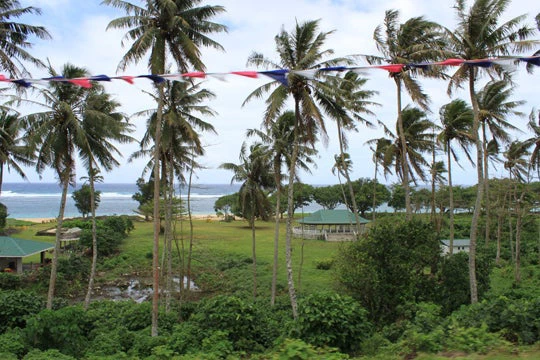Seven takeaways from the 3rd Small Island Developing States conference, or what the World Bank Group heard in Samoa:
Keep It Simple. Small island nations are calling for development partners to simplify access to development and climate finance.
The bank is listening. We must not burden small islands with bureaucracy. Simplified procurement procedures have been adopted for the thin capacity environments of the Pacific and task teams have been decentralized to the countries.
At the SIDS conference, the Bank responded to demands from small island nations and announced plans to build on what is in place and work with partners to create a Small Islands States Resilience Initiative that will cut the red tape for island nations, pool donors resources, reduce processing time and help small islands access funding for resilience and climate change.
Step it Up. We're past time for talk; it’s time for action. In atoll nations such as Kiribati, Marshall Islands, Maldives, Cook Islands, Tuvalu and Tokelau, the land is almost level with the ocean and even a high tide can bring severe damage. The leaders believe the real and present danger of their climate change crisis is not understood by the international community and their needs have been ignored. They formed the Coalition of Atoll Nations on Climate Change to brig attention to the reality of the crisis and step up demand for support.
The Bank Group has greatly increased support to small islands since the 2009 financial crisis and a series extreme weather events devastated communities and economies. The current program is $3 billion, with $700 million in annual commitments. The Bank is boosting its climate and disaster funding for small islands from $140 million to $190 million this year. But communities faced with losing their island homes need much more support from the international community. The atoll communities have nowhere to go in the face of climate change and as the young Marshall Islands poet Kathy Jetnil-Kijiner says are nothing without their islands.
Bring business to the table. The private sector has a bigger role to play, there are investments opportunities in tourism and fisheries and sustainable jobs are the pathway out of poverty. Tourism creates one out of every 11 jobs worldwide. A study of the impact of cruise tourism on Vanuatu funded by the World Bank Group, Carnival Australia, and the Australian government found that the cruise industry creates more than 3,000 jobs.
Make health everybody’s business. Participants agreed we need much more than a paddle to turn around the non-communicable disease (NCD) crisis that is threatening economies and livelihoods in the Pacific and other small island nations. A roadmap crafted by the World Bank, WHO, Secretariat of the Pacific Community, Australia and New Zealand will form the basis of a new Pacific Partnership set up to control NCDs. It recommends 4 priority actions on tobacco control, reducing consumption of unhealthy drinks and food, improving effectiveness of public expenditure on health and learning exchanges.
Filling the missing middle to grow the blue economy. Participant were excited about the World Bank helping to fill the investment gap that comes between small often CSO led projects that pilot solutions and large private sector investment in fisheries. Bank investment is needed to bridge that gap and support public sector reforms that crowd in the lessons from the CSO work and scale them up and de-risk the sector for businesses.
Put an end to fragmentation. Partnership was the theme of the conference and many new partnerships were announced including 90 new clean energy partnerships that will support countries as they transition to clean energy. While support for partnerships that pool resources, combine expertise and maximize efficiencies is universal, the broader message from participants was a plea to end fragmentation across programs. Partnerships that are uncoordinated or competing can cause fragmentation and reduce impact. And furthermore in most cases regional approaches to programs and partnership deliver more and better.
Fix the debt - graduation from least developed country status brings further risks. The Bank is listening and is building flexibility into WBG financial instruments. For example IDA funds for small islands allow a lower interest rate, longer maturities and grace periods. The Comprehensive Debt Framework is being piloted in Grenada. It is designed to help small island nations build resilience, enhance competitiveness and stimulate private sector led growth and potentially reduce debt stock. Donors and commercial debt holders will need to come together to support other island nations to take the next steps.
So, back to the top, keeping it simple puts an onus on development partners to adapt as small island states are forced to continue their adaptation to the persistent challenges of development made more difficult by the onset of growing climate change impacts. The prime minister of Samoa was polite but firm: don’t just talk the talk; walk the talk.
Rachel Kyte
World Bank Group Vice President & Special Envoy for Climate Change
www.worldbank.org/climate
Twitter: @rkyte365
Photo: Juliana Knapp/World Bank



Join the Conversation